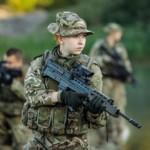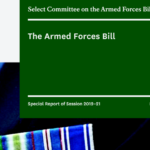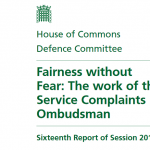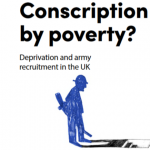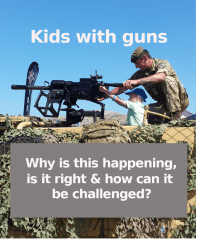We look at the following issues:
- Young people are not adequately supported to make an informed choice about enlistment, and a sanitised or glamourised view of military life and warfare is promoted.
- The armed forces target recruitment activities at children, and are involved in education and youth organisations.
- Military environments are not suited to recruits under the age of 18, and the armed forces do not accept full duty of care obligations.
- Problems such as bullying and harassment are common in the armed forces.
- Armed forces personnel are subject to unduly restrictive terms and conditions of service.
- Too little recognition is given to the moral impact of military service and subsequent mental health problems.
Also see the work of the Child Rights International Network (CRIN) on recruitment of under-18s into the UK armed forces.
Useful resources
Public poll on minimum age of armed forces recruitment
Submission to the Human Rights and the Scottish Parliament inquiry
 This submission made by ForcesWatch and Quakers in Scotland to the Scottish Parliament's human rights inquiry details our concerns around the need for regulation and transparent accountability of military activities in schools, the lack of education about peace and human rights, and the continued recruitment of children into the UK armed forces.
This submission made by ForcesWatch and Quakers in Scotland to the Scottish Parliament's human rights inquiry details our concerns around the need for regulation and transparent accountability of military activities in schools, the lack of education about peace and human rights, and the continued recruitment of children into the UK armed forces.
Evidence submitted to the Armed Forces and Veterans Mental Health Inquiry
The First Ambush: Effects of army training and employment
 This report from Veterans For Peace UK details how the Army's training process has a forceful impact on attitudes, health, and behaviour even before recruits are sent to war. The findings show that military training and culture combine with pre-existing issues (such as a childhood history of anti-social behaviour) to increase the risk of violence and alcohol misuse. Traumatic war experiences further exacerbate the problem.
This report from Veterans For Peace UK details how the Army's training process has a forceful impact on attitudes, health, and behaviour even before recruits are sent to war. The findings show that military training and culture combine with pre-existing issues (such as a childhood history of anti-social behaviour) to increase the risk of violence and alcohol misuse. Traumatic war experiences further exacerbate the problem.
Soldiers at 16 – The other side of the story
Does the military give young people a ‘leg up’? The armed forces and social mobility
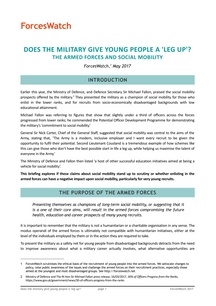
This briefing explores if these claims about social mobility stand up to scrutiny or whether enlisting in the armed forces can have a negative impact upon social mobility, particularly for very young recruits.
Is it Counterproductive to Enlist Minors into the Army?
The Recruitment of Children by the UK Armed Forces: a Critique from Health Professionals
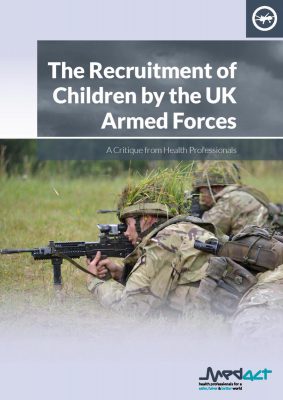 Medact’s report on the long-term impacts of the British military’s recruitment of children under the age of 18, presents evidence linking ‘serious health concerns’ with the policy, and calls for a rise in the minimum recruitment age. It looks at the psychological and psychosocial vulnerabilities of adolescents in the context of military recruitment marketing strategies and making long-term risky decisions and examines the evidence that under 18 recruits face greater risks to health than adult recruits, across the course of an armed forces career.
Medact’s report on the long-term impacts of the British military’s recruitment of children under the age of 18, presents evidence linking ‘serious health concerns’ with the policy, and calls for a rise in the minimum recruitment age. It looks at the psychological and psychosocial vulnerabilities of adolescents in the context of military recruitment marketing strategies and making long-term risky decisions and examines the evidence that under 18 recruits face greater risks to health than adult recruits, across the course of an armed forces career.
UN observations on UK and childrens’ rights
Soldiers at 16: Sifting fact from fiction
 Published by Child Soldiers International, this short and accessible booklet addresses questions often raised about under-18s in the armed forces, presenting the facts - based on extensive research - rather than the fiction. Also contains very useful quotes and statistics. Great when talking to your MP or for those thinking of enlisting!
Published by Child Soldiers International, this short and accessible booklet addresses questions often raised about under-18s in the armed forces, presenting the facts - based on extensive research - rather than the fiction. Also contains very useful quotes and statistics. Great when talking to your MP or for those thinking of enlisting!



